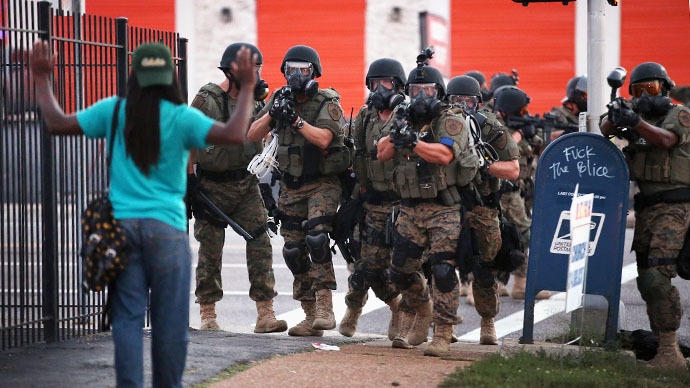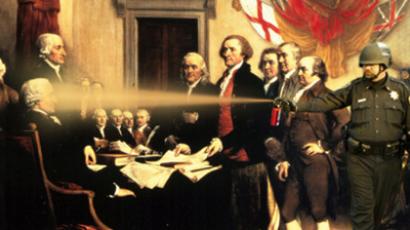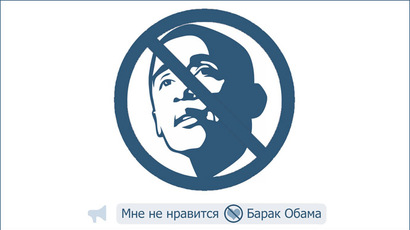#IfTheyGunnedMeDown: Social media calls out MSM for portrayal of Mike Brown

If you were killed, what photo would the media use in their stories? That’s the question that the #iftheygunnedmedown hashtag asks on social media as minorities point out media bias in the deaths of African-Americans.
The question comes after the shooting death of Mike Brown in Ferguson, Missouri on Saturday. The unarmed 18-year-old was about to begin college when he was killed by a police officer. But the mainstream media shows a picture of Brown flashing a peace sign, which Yesha Callahan at The Root says has been called a “gang sign” by conservative outlets. She calls this the “Trayvon Martin effect.”
If you died, which picture would the media use? #IfTheyGunnedMeDown#MikeBrownhttp://t.co/lJMM9a0owkpic.twitter.com/YYxIbPB0xA
— The Root (@TheRoot) August 11, 2014
“The vicious slaying of Mike Brown by Ferguson, Mo., police has once again shown that the narrative the media paints surrounding black people in America more often than not includes depicting us as violent thugs with gang and drug affiliations,” Callahan wrote.
So young African-Americans took to Twitter and Tumblr and other social media, posting contrasting pictures of themselves ‒ a wholesome image of themselves in a military uniform, for instance, juxtaposed with a more tawdry one, such as holding up their middle fingers and snarling ‒ and using the trending hashtag. The meme asks which photo the mainstream media would use if the picture’s subject were gunned down by police (like Brown) or by a non-African-American (like Martin).
Yes let's do that: Which photo does the media use if the police shot me down? #IfTheyGunnedMeDownpic.twitter.com/Ng0pUlxWhr
— YoungGifted&Black✊ (@CJ_musick_lawya) August 10, 2014
Would the media use the picture of them at their best? Or the one of them that might garner less sympathy? Would their picture help portray them as victim of police brutality or as a thug the cops were right to be wary of?
#IfTheyGunnedMeDown today what picture would you use America? Where is the justice. pic.twitter.com/birjvOrjzN
— Quinton Jones (@QDOTjones) August 11, 2014
Journalist Glenn Greenwald tweeted that the campaign “is a brilliant and powerful use of social media.”
#IfTheyGunnedMeDown what pic will the media use ? pic.twitter.com/zS6rcdQEZf
— #3Hunndunn (@GrindHard_vash) August 12, 2014
“#IfTheyGunnedMeDown isn’t just demanding that people... see past clothing. It’s questioning if it’s possible for people, especially young black men, to live their lives online without worry that an innocent photo of them gettin’ gully at a party will somehow become re-appropriated as evidence of black thuggery,” the Washington Post’s Morning Mix wrote.
“The hashtag asks if black teens have the same right as others to make mistakes — to do dumb things and post about it on Facebook or clown around with their friends — without becoming branded in perpetuity.”
This makes the hashtag #IfTheyGunnedMeDown so powerful. It's sad that some people have taken it to another level. pic.twitter.com/oZnLDRRDhN
— Sammie. ™ (@LordSWVP) August 11, 2014
Time called the meta-protest “a simple, ingenious DIY form of media criticism: direct, powerful, and meaningful on many levels.”
#IfTheyGunnedMeDown would I be labeled an honor grad or a blunt smokah pic.twitter.com/BCaRqMCMn8
— (@TopFlightRod) August 11, 2014
Yet social media has also negatively impacted the tensions in Ferguson, where riots and looting broke out Sunday and Monday nights. On Tuesday, authorities announced they would delay releasing the identity of the police officer who shot Brown, citing threats against the cop on social media.
#IfTheyGunnedMeDown They would probably forget to mention anything positive. pic.twitter.com/94MR3nHnqd
— Nichole Davis ✌️ (@NsDavis01) August 10, 2014
Ferguson Police Chief Thomas Jackson had said he would reveal the officer's name by noon Tuesday. Police department spokesman Timothy Zoll said because of the threats there is now no timetable for release of the name, USA Today reported.
Authorities have not released the race of the officer, but at least one witness said the policeman was white. The shooter was placed on administrative leave during the investigation, which the FBI has joined. The police chief did release some information, however. The officer involved has been on the force for about six years, and was on a routine patrol when the interaction with Brown began, the Belleville News-Democrat reported.
Jackson said the Ferguson police force is made up of 53 officers, only three of whom are African-American. He added that the city has had trouble recruiting and retaining black officers.
Following two nights of violence, tensions have eased on Tuesday, with a large crowd milling through the city, seemingly aimlessly, according to tweets by KSDK’s Casey Nolen.
At a prayer vigil at Christ the King Church, Gov. Jay Nixon (D-Mo.) called for justice and peace.
Gov. Nixon speaks to crowd at Christ the King church. Calls for Justice and Peace. pic.twitter.com/XIq8TStIq7
— Tony Chambers (@tonychambers) August 13, 2014














